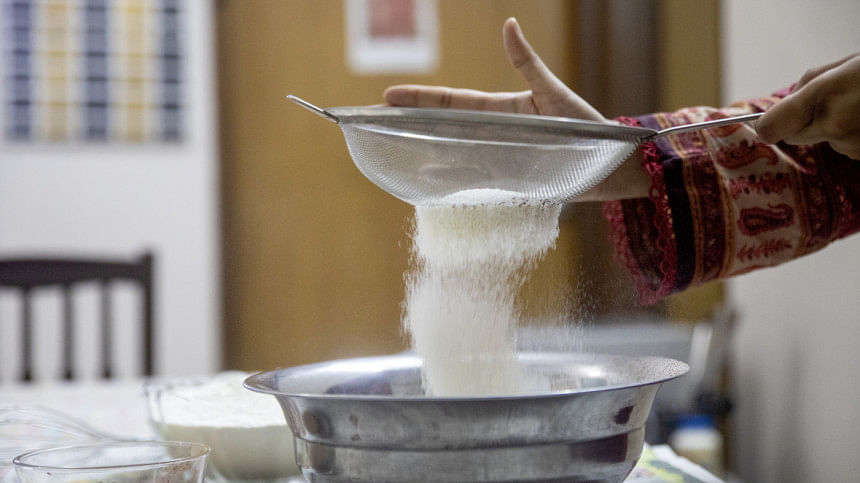Young entrepreneurs and the many challenges they face

Bangladesh is one of the fastest-growing economies in Asia. With a large and youthful population, the country has seen a surge in young entrepreneurs over the last decade. Each of these business owners has their own reasons that propelled them to start their ventures.
For Anjuman Ara Islam, her online-based bakery shop – Little Miss Baker – began as a way to engage herself in a productive activity. "Back in 2019, I had failed to crack the admission tests of my target universities," she says. "Although it obviously wasn't the end of the world, it did feel like it at the time. With encouragement from my family and friends, I managed to pull myself out of that slump and open an Instagram page featuring all the cakes I had baked for them that year. I started receiving orders soon after. As a result, what started as a hobby at first transformed into a full-fledged business over the past six years."
Then there are others, like Tasneem Zaheen Samiha – a student at Bangladesh University of Professionals (BUP) – whose desire to achieve financial independence pushed them to start their own businesses.
Samiha explains, "Although my university offers buses, it can get hectic if I must catch the bus at 7 AM when my classes don't start till 12 PM. My other options are to commute via the local bus, which can get quite unsafe for women, or by rickshaw or CNG. I prioritise travelling comfortably; hence my transportation costs can go up to Tk 300 per day, amounting to Tk 6000 per month. As a grown-up, it felt embarrassing to ask for money from my parents. Hence, I started my business within a night's decision."
Some young entrepreneurs also begin their entrepreneurial journey to make a difference in their surroundings. Sayed Zubaer Hasan, a social entrepreneur and climate refugee, asserts, "I grew up in a farmer family myself, so I know the pain that farmers in Bangladesh continue to go through."
Zubaer elaborates, "Farmers struggle to break-even even when the prices of vegetables in kitchen markets are skyrocketing, as middlemen take most of the profit."
To address this issue, Zubaer purchases vegetables at fair prices from around 17,000 registered farmers across the country and sells them directly in kitchen markets across Dhaka.
Now, the initial days of starting a business are rarely smooth. Praptee Rani Sarkar, co-founder of Shesher Shuru, a handicraft business, says, "My business uses scrap fabrics collected from factories and tailor shops to make jewellery, dresses, etc. In the early days, our family members weren't happy with the fact that we were hoarding 'waste' inside our houses. Sadly, we don't have the facilities to store our raw materials elsewhere."
Moreover, young entrepreneurs often juggle the dual roles of being a student and a business owner, facing several additional challenges along the way.
"Most young business owners often end up quitting," laments Samiha. "It is a very laborious job. As an entrepreneur, you are left to oversee operations, manage finances, deal with customers, and promote your products single-handedly. It can be hard to maintain a decent work-life balance, particularly when you are a full-time student."
For full-time students who are also pursuing their entrepreneurial dreams, sticking to a fixed routine or work timeline becomes difficult. Such has been the case with Anjuman, who usually takes a smaller number of orders or stops taking orders entirely during her exams. Unfortunately for student entrepreneurs like her, classes and exams can get cancelled without any prior notice. That, in turn, impacts their preset work routine.
Apart from work-life balance, entrepreneurs also face struggles in various other forms.

"There is a common misconception that business owners earn a lot of money," says Praptee. "My friends sometimes ask for freebies, and as much as I would love to gift it to them, my business is currently self-funded. If I start handing out free stuff to everyone, I will struggle to pay my employees a fair wage."
Young entrepreneurs also experience hurdles associated with business-specific operations. Samiha, for instance, owns a clothing business that takes pre-orders. She takes orders from her customers and then places an order on their behalf to her suppliers.
"Garment owners receive orders for the same article of clothing from different businesses and proceed only when they achieve their Minimum Order Quantity (MOQ)," Samiha explains. "This means that they may decline to proceed with our order at the very last minute if the MOQ quota is not met."
Samiha adds, "Sometimes, the customers themselves can make running a business difficult. As mentioned earlier, I take orders and then place them with my supplier. But if customers refuse to accept their parcels when they arrive, I am left scrambling to find someone with a similar body type willing to buy those dresses. It's incredibly inconvenient."
Then comes problems associated with the exchange rate, which specifically concern those who have to import raw materials or goods from abroad.
"Since I usually use imported raw materials for my baked products, my cost heavily depends on the value of our currency compared to the dollar," says Anjuman. "Even if the value of the taka appreciates, the prices of imported goods rarely adjust accordingly. Hence, I had to slightly raise my prices to reflect the increased cost of raw materials."
Jahir *, a young importer based in Dhaka, adds to this, "As someone who imports goods regularly, I can tell you that it's not just the exchange rate, it's the entire system. You would think a stronger value of taka would mean lower prices, but that rarely happens. Most of us must rely on informal shipping channels that don't respond to currency changes the way legal trade channels do."
Jahir* further explains, "Most of these shipping companies use hundi – an unofficial money transfer method. There's no traceable rate, no receipt, and no real accountability. Even if the official exchange rate improves, the hundi rates might not reflect that. Plus, these companies charge absurd handling and 'service' fees that remain high regardless."
According to Jahir, while there are legal channels for transferring money, they're mostly accessible only to big businesses. Besides, Jahir also claims that the customs process itself can be a nightmare. "A product that should clear customs in a week can take months unless you have 'connections' inside. That's why many of us are forced to use these informal routes, despite knowing the risks," he bemoans.
Further discussions with these young entrepreneurs revealed that the problems they face tend to be multifaceted, with each of them facing unique challenges.
For Praptee, her handmade goods are priced higher because they aren't factory-made, and she values the human touch that makes them unique. Meanwhile, Zubaer's lack of industry connections and mentorship forced him to navigate business challenges through trial and error, as most available advice is theoretical and impractical.
On the other hand, Samiha encountered new competitors undercharging to attract customers. This disrupts the market and makes it hard for others to break-even. According to her, these businesses struggle to sustain themselves in the long run. Moreover, because there are competitors selling their products at a lower price, customers often doubt established sellers, assuming they're the ones being unfair.
However, one common struggle that all business owners face is access to finances.

"My business partners and I had invested all our savings to start our business," says Praptee. "We cannot apply for external funding as they expect to see a diverse array of products that we are unable to present because of a lack of funding in the first place."
Adding to this, Anjuman adds, "Online business owners do not have enough documents to open a business account and are not recognised as small business owners. Hence, we can't usually access mainstream loan options designed for women entrepreneurs. Those are reserved for women who start businesses like boutique shops and parlours."
Apart from loans, finding investors is also a huge challenge for such young business owners, as Zubaer explains, "Startups need huge capital to scale up. However, we don't have the capacity to show collateral to secure traditional loans. The local investors aren't really interested in investing in startups. Hence, I had to focus on securing international grants to make my business a viable enterprise."
Zubaer also explains, "I had to teach myself how to apply for and secure non-refundable grants, equity funding, safe notes and convertible loans. It took me around one to two years just to access the proper amount of funds. This halted my business operations and impacted its health and profitability."
This issue is an even more complex challenge for those who are unable to access banks. Faruk, a 20-year-old street food vendor based in Mirpur, says, "Selling street foods, like fuchka, is a very unpredictable business. During the rainy season, my sales drop significantly. I also have to switch to other ventures sometimes, like I sold strawberries during the month of Ramadan."
Faruk continues, "I have a family of seven. To meet their necessities, I have to send home around Tk 20,000 per month. Moreover, I pay around Tk 10,000 every month in instalments. I would love to open a corner shop one day, which is a more stable business, but I don't think I can afford to bear any more debt right now."
For business owners like Faruk, securing loans from traditional banking channels can be challenging, as they often lack both the knowledge to navigate the application process and the documents required by banks. As a result, they are vulnerable to falling into the traps of informal money lenders, who are widely regarded as oppressive due to their exploitative practices such as charging exorbitant interest rates.
All this goes to show that the life of a young entrepreneur is rarely glamorous and almost always filled with struggles and new challenges. The challenges in question often vary from industry to industry, yet, these young minds try their best to persevere.
*Name has been changed upon request
Tazrin is a contributing writer at The Daily Star. Feel free to send her your favorite tea recommendations at [email protected]

 For all latest news, follow The Daily Star's Google News channel.
For all latest news, follow The Daily Star's Google News channel. 











Comments